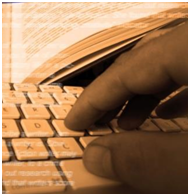Learn how Editors turn good work into great work
 Understand the mechanics of clear writing.
Understand the mechanics of clear writing.- Develop your skills in use of grammar, punctuation, and spelling.
- Develop your use of language.
- Learn about working to house styles and using style sheets.
- Develop a knowledge of design and layout.
- Learn about the final stages of proofing and preparing content for publication.
The Role of the Editor
The best editors are detail-oriented and love language. They're not nit-picky for the sake of nitpicking - they are nit-picky because they're focussed on communication and messaging. An editor's role is to work with a writer, to achieve the best version of a piece.
Although it may seem like only editors need editing skills, the clarity, concision, and precision required are useful across many industries. In this course, you'll work with our expert academics to improve your understanding of these core concepts, and take your communications skills to the next level.
Gain Valuable Skills with Many Applications
Throughout this course, you'll learn about the role of the editor, different types of editing and proofreading, and how to mark a manuscript. You'll also study the publication process from start to finish.
- Learn a skill that can help your employment or business prospects across a range of industries.
- Work in publishing as an editor, proof reader or writer.
- Editing skills bring together the ability to focus with an ability to communicate – highly valuable life skills in marketing, management and elsewhere.
- Interact with and be monitored by experienced editors.
COURSE STRUCTURE AND CONTENT
Lesson 1. Introduction to Editing
- The Role and Scope of Editing
- Tools for Editing
- Editing Skills
- The Production Process
- An Overview
- Who Does What in Publishing?
Lesson 2. The Mechanics of Clear Writing
- Spelling
- Punctuation
- Grammar
- Language
- Style
- Tense
Lesson 3. Assessing Manuscripts
- Readability
- Word Length
- Structure
- Consistencies and Inaccuracies
- The Reader’s Report
- Substantive Editing
- The Author’s Responsibilities
- The Author/Editor Relationship
Lesson 4. Copy Editing I
- Copy Editing
- Procedure
- House Style
- Style Sheets
Lesson 5. Copy Editing II
- Marking Up
- Parts of A Publication
- Editing Non-Text Material
- Illustrations
Lesson 6. Preparing Copy for Printing
- Type Design
- Page Layout
- Proof Stages
Lesson 7. Proofreading
Lesson 8. The Final Stages
- Indexes
- Blurbs (Promotional Content Summaries)
- Checking Final Proofs
COURSE AIMS
- To gain an understanding of the role and scope of editing.
- Understand the importance of clear, effective writing throughout all stages of the publishing process.
- Describe the procedure of manuscript assessment.
- Describe the procedures used by copy editors.
- Explain procedures used to prepare copy for printing.
- Describe the checks and procedures used in the final stages of preparing and printing publications.
The Scope of Editing
 When someone writes or illustrates something, they are attempting to communicate with their readers. We naturally think of editing as relating to books, magazines and newspapers, which are the traditional media with which an editor would work. These areas, commonly referred to as “print media”, are still very much part of the work covered by editors, but today the scope is far wider.
When someone writes or illustrates something, they are attempting to communicate with their readers. We naturally think of editing as relating to books, magazines and newspapers, which are the traditional media with which an editor would work. These areas, commonly referred to as “print media”, are still very much part of the work covered by editors, but today the scope is far wider.
Print media is generally “commercial” work; that is, publications that are created for selling. Writing and illustrations are also created for other situations though, beyond the traditional print media, including:
- Marketing material, such as advertisements, brochures, posters, signs, labels and packaging
- Newsletters (printed or electronic). Newsletters may be commercial (e.g. for promotional purposes, or subscriptions) or non-commercial (e.g. a school or club newsletter, or a family Christmas letter)
- Business letters
- Contractual documents
- Web sites
- Calendars
- Educational material (course notes)
- Scripts (plays, videos, radio shows, etc.)
Writing and/or illustrations used in any of the above situations can fail in their attempt at communication to a lesser or greater degree, for many reasons, including:
- Typographical errors
- Unclear communication
- Ambiguity
- Incorrect punctuation
- Poor grammar
- Poor spelling
- Inappropriate use of language.
- Not writing for the correct “audience”
Balance: pragmatic versus pedantic
Some editors are excessively pedantic. Others are overly pragmatic. In reality, the extent to which a document is edited should be clearly specified by the publisher, and the good editor will be able to adjust the way they edit according to those specifications.
In today’s world, where economics is a major force, the luxury of perfection is often neither required nor expected by a publisher. A certain amount of error may often be more tolerable than not meeting a deadline or over blowing the budget.
The effective editor needs to take a pragmatic approach and be comfortable with the fact that perfection is not always possible.
A Student's View of Editing I
"It took me a while but in the end it was a very useful course for my work. I would like to really thank my tutor for all her feedback which improved my proofreading skills."
Premo Jackniacki
Increase Your Value; Invest in Your Future
Editing is a highly sought after skill. Whether you want to work as a professional editor or need to use editing as part of your current job, developing your ability and knowledge can provide you with essential skills which you can apply to your work.
- It can help to improve your job performance.
- It can help to improve your job and career prospects.
Editing I is suitable for beginners and those who want to improve their editing skills.
Studying with ACS
Our aim is to provide a wide choice of subjects and flexible options to learning for our students. All of our courses are studied by distance learning, enabling you to study when and where you choose to. Our highly knowledgeable tutors will guide you through the course, and support is available to you whenever you need it.
Often the problem with distance learning is that you feel you are on your own, and have limited access to resources, to ask questions and obtain assignment feedback.
ACS provides the highest level of support possible. Students can:
- Talk directly with tutors by phone.
- Email questions and receive an email back in 24 hours.
- Access additional information that has been reviewed and recommended by our academics (through an online library or directly from tutors where needed for your studies).
- Order e-books from our bookshop at www.acsebooks.com
If you have any questions - please ask us
You can enrol on the course at any time, so - why delay? Enrol today.
If you have any questions about the course, or would like to know more about studying with ACS, please get in touch with our specialist Writing and Journalism tutors. They will be happy to answer your questions and discuss your goals.